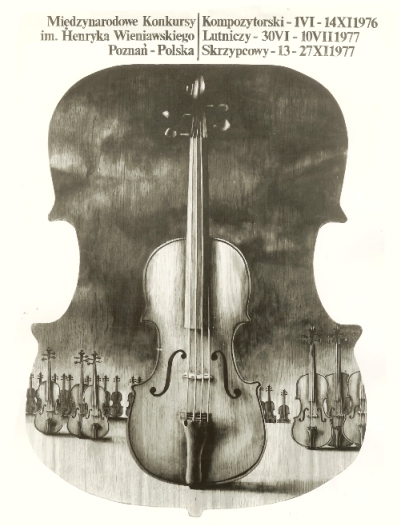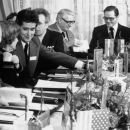7th International Henryk Wieniawski Violin Competition
Poznań, 13-27 November 1977
Watch a documentary about the competition:
It was a true odyssey! Something like this never happened to me before. First of all, however, I am full of admiration for the town, which, in spite of so many adversities, did everything to make my concert materialize. I also wanted to perform very much; I shall never forget that 25 years ago it was on this very stage that I enjoyed my first international success...”, having relaxed after the event’s opening concert, Igor Oistrakh started his story. The long and extensive preparations for the event were for the first time coordinated by Andrzej Wituski, the then Deputy Mayor of Poznań. At daybreak on 13th (!) November, when everything was ready to a tee, a thick blanket of autumn fog enveloped Bratislava, where Igor Oistrakh performed the night before. The morning flight to Poznań, which was scheduled to land at 10 a.m., was cancelled. Without mobile phones and the Internet, with just a chain of open-minded people, the organizers luckily managed to deliver the priceless passenger (who made the last leg of the journey on board of an ambulance aircraft), and bring the odyssey to a close at 4:15 p.m. Three quarters of an hour later, the soloist already rehearsed with the Philharmonic Orchestra, and at 8 p.m. was ready to perform Tchaikovsky’s Concerto.
Chroniclers of the 1977 Wieniawski Competition endlessly dwell on the incident. It has assumed a legendary status and, however briefly, it has to be recalled before we move on to this singularly fascinating, three-stage young violin player contest. The keenest rivalry took place between musicians from the two political superpowers, although the Japanese and the Poles also added spice. The audience were electrified, the journalists full of excitement; the names of Brodsky, Bron, Kurosaki, or Milewski soon became very popular. Noticeable everywhere, young people from the “Pro Sinfonika” music-lover movement cranked up the atmosphere. The movement’s particular clubs took care of different nations participating in the competition. Without a question, the players who enjoyed greatest popularity were the Americans: Lucia Lin, the youngest participant of the event, as well as the competition audiences’ favourite, Peter Zazofsky and his pianist, Scott Feigin. Concerts by famous choirs, exhibition previews,music sessions at schools fostered social life, which, like never before, flourished off the main competition venue.
Although the event (at least for the host nation) began on the nervous side, it ended to universal acclaim.With their final verdict, the jury managed to reconcile the main protagonists’ supporters. Music lovers from Poznań had finally had their laureate, who — during the result announcement ceremony — was represented by his… dad. When asked about Piotr, Mr Milewski answered most unhurriedly, “He is fast asleep; after all, it is the middle of the night, isn’t it?”. “When are we going to tell him about the success?”. “In the morning, when he wakes up”. The triumphant Wadim Brodski was overjoyed. He won the Competition playing no less than Wieniawski’s Stradivarius. However, he had to immediately return the hired instrument to the state collection in Moscow. No sooner had he returned the jewel, though, than he himself returned to Poland. With Polish citizenship (having married in Warsaw), he lives in Italy. One of the Japanese laureates, in turn, Asa Konishi, settled in Switzerland. Soon after the competition to her family’s she added a second name: Jankowska, after her husband, a young engineer from Poznań, son of Helena Jankowska, the octolingual living legend of the Poznań event.
source: R. Połczyński, Da Capo. 75 lat Międzynarodowych Konkursów im. Henryka Wieniawskiego
Read more about the 7th Competition (PDF, 564 KB) >

A poster of 7th edition of Wieniawski Violin Competition designed by W. Schmidt.
JURY MEMBERS
Chairman: Irena Dubiska (Poland)
Zenon Brzewski (Poland)
Jean Fournier (France
)
André Gertler (Belgium
)
Stefan Gheorghiu (Roumunia)
Frederick Grinke (Great Britain)
Krzysztof Jakowicz (Poland
)
Jadwiga
Kaliszewska (Poland)
Emil Kamilarov (Bulgaria
)
Wolfgang Marschner (GFR)
Igor
Oistrakh (USSR
)
Zenon Płoszaj (Poland
)
Franz Samohyl (Austria)
Werner Scholz (GDR
)
Jiři Tomašek (Czechoslovakia)
Roman Totenberg (USA)
Yoshio Unno
(Japan)
PRIZE WINNERS
1st prize: Vadim BRODSKY (USSR
)
2nd prize: Piotr MILEWSKI(Poland), Mikhail VAIMAN
(USSR
)
3rd prize: Zakhar BRON
(USSR), Peter A.
ZAZOFSKY (USA
)
4th prize: Charles A.
LINALE (France
)
5th prize: Hiro KUROSAKI
(Austria), Anna A. WÓDKA (Poland)
6th prize: Kazuhiko SAWA (Japan)
Awards: Asa Konishi (Japan); Keiko Mizuno (Japan)


















